General Discussion
Related: Editorials & Other Articles, Issue Forums, Alliance Forums, Region ForumsJust out of curiosity, when the British invaded the colonies,
Did the colonial press take sides? Or did they dispassionately and "objectively" simply report that the British were invading and attacking and ho hum, I guess we'll just run a poll to how the colonists feel about that?
Asking for a friend.
ExciteBike66
(2,436 posts)They probably all ran silly cartoons featuring George III oppressing them.
unblock
(52,758 posts)Backseat Driver
(4,423 posts)woodcuts and engravings to tell a story...no cameras then, but there was local advertising. Some times silversmiths were called to this purpose because they were already trained to engrave on metals (Paul Revere). Printers distributed local encouragement for and against both Tories and colonialists (Patriots). When he was in the USA, Ben Franklin and others distributed to Patriots his thoughts on independence from King George's kingdom across the pond and common sense wisdom pamphlets and posters.
https://www.nps.gov/articles/000/printmaking-in-the-american-colonies.htm
elleng
(131,832 posts)I suppose "the British are coming" is actually neutral. I mean Paul revere didn't say that was a good thing or a bad thing ![]()
Aristus
(66,700 posts)It's difficult to know what Paul Revere might have said on his midnight ride, since he was captured and arrested not long after he started. But his announcement would not have included the "British" as an other; they were all British, as far as they were concerned. He likely notified the local militia leaders that "the regulars were out" meaning British troops, since the colonies only had citizen militias, and not regular army troops.
unblock
(52,758 posts)Or nowadays online or on video or tape or something. But oh, Samuel Clemens this at a party once, yeah, maybe.
They were also nicknamed "bloody backs" and "lobsters" by colonists...so I wouldn't be surprised if Revere and company called them that on their midnight ride.
Wednesdays
(17,624 posts)John Adams wrote that approximately one-third of the American population supported the move for independence (Patriots), one-third of the population supported the king (Loyalists), and one-third supported neither side (neutral).
I suspect the colonial press was divided similarly.
unblock
(52,758 posts)They'd have a lot of pro-George iii media and "neutral" media and maybe a tiny obscure pro-independence media somewhere.
"Oh but everyone is so excited to read what George iii has to say next!"
yagotme
(3,088 posts)a bunch of guys dressed in red jackets would come to your establishment, and "rearrange your furniture".
IA8IT
(5,601 posts)back then
Sneederbunk
(14,367 posts)Harker
(14,189 posts)unblock
(52,758 posts)C_U_L8R
(45,074 posts)The thrirteen colonies were British Colonies until, y'know, revolution.
unblock
(52,758 posts)But if you want money for people with minds that hate,
All you have to say is make America great ...
getagrip_already
(15,242 posts)they were merely bringing in more regular troops to reinforce what they already had barracked in the cities.
They just didn't have enough to maintain order among a restless population.
But they could close down newspapers or arrest rabble rousers if they could find them.
Igel
(35,443 posts)1812.
That was a British invasion.
Sympthsical
(9,238 posts)Whatever the views of the publisher were was what one could expect to read in the paper. The idea of objectivity, ethics, and interpretation - what we currently viewed until fairly recently as ideal journalism - largely materialized in the 20th Century.
So every newspaper pretty much took a side in whatever the issue of the day was based on where their partisan sympathies were.
One of the more entertaining aspects of the Civil War is doing a deep dive on how newspapers rode Lincoln's ass every step of the way and his reaction to them. (Also, political partisans would pose as reporters and plant stories in the papers back then).
It was a scene.
It feels like we're circling around somewhat back to that. To get a whole view of facts requires reading a lot of sources nowadays, because the media are preoccupied with narratives. If the facts fit the narrative, great, include them. If they don't, well, maybe we just won't mention that . . . So when you try to pin things down, they'll remark, "I'm just reporting facts! Prove it's not factual!"
Sure. But what facts you choose to present and omit has a large impact on narrative. And we've just accepted that narrative is king. Social media are making it a lot worse.
Oh well. It was a good run of seventy or so years.
former9thward
(32,267 posts)There was little first amendment freedom in the Civil War.
https://historyengine.richmond.edu/episodes/view/6525
Sympthsical
(9,238 posts)There was a book - struggling to remember the title - that went over his and Seward's relationship with and attitudes toward James Gordon Bennett of the New York Herald. There was one hilarious instance where they held an ambassadorship over his head - that they never intended to give - in order to get him to shut up for a month.
LeftInTX
(26,109 posts)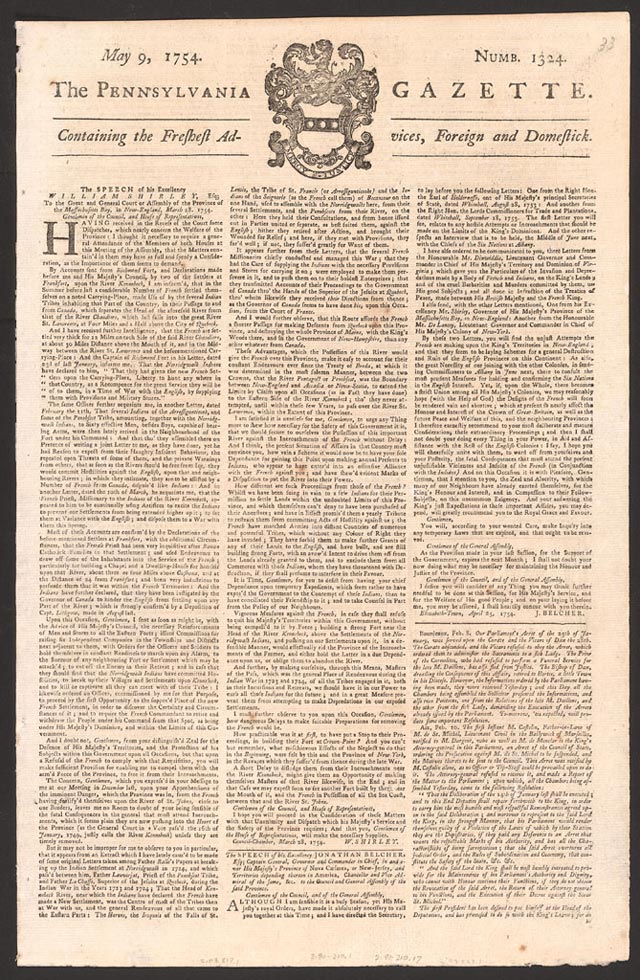
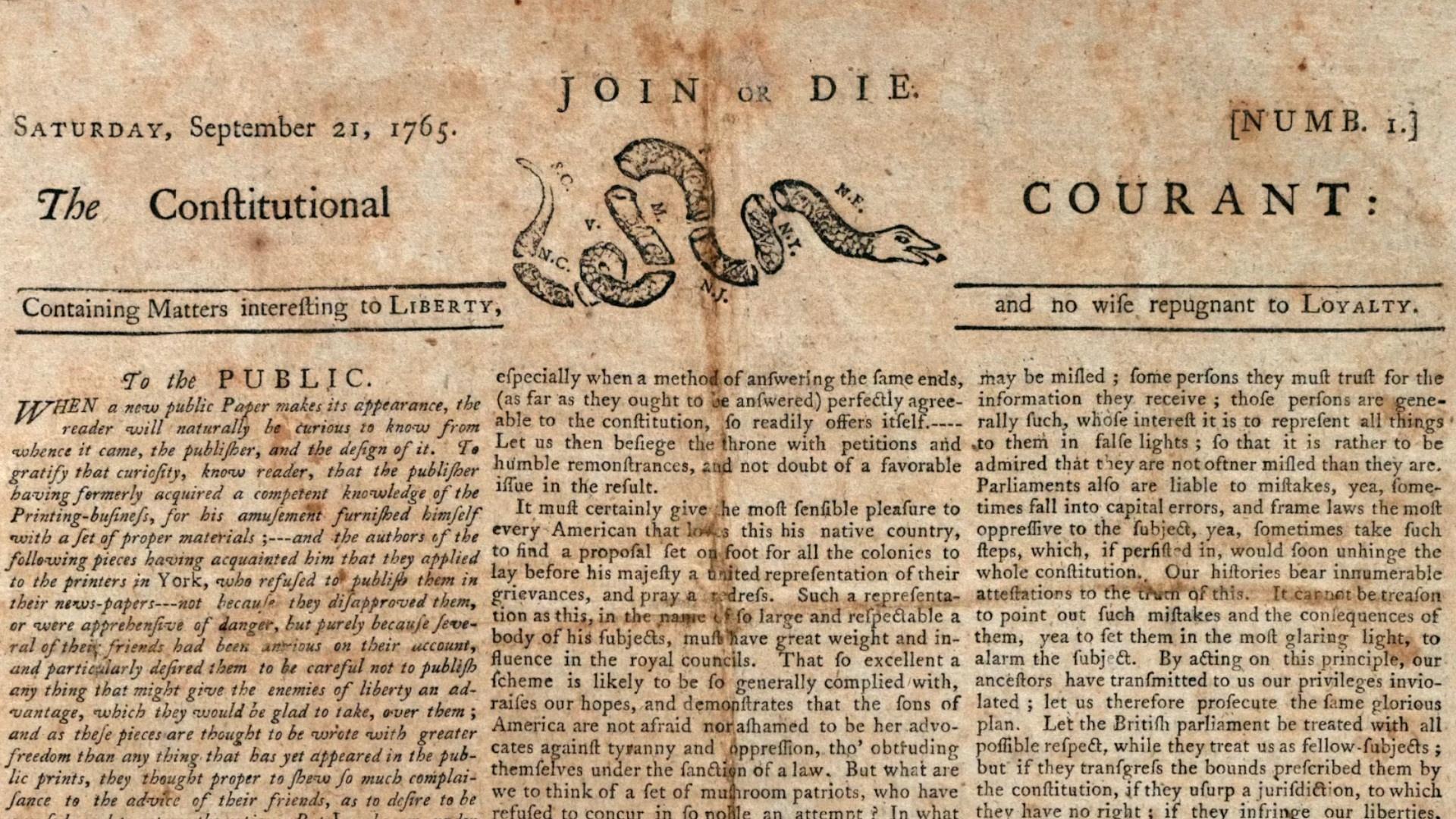
Massachusetts Spy

The newspaper was heavily political and found itself constantly on the verge of being suppressed by the British colonial government, from the time of its establishment in 1770 to 1776 and through the beginning of the American Revolution.
https://en.wikipedia.org/wiki/Massachusetts_Spy
Boston Gazette
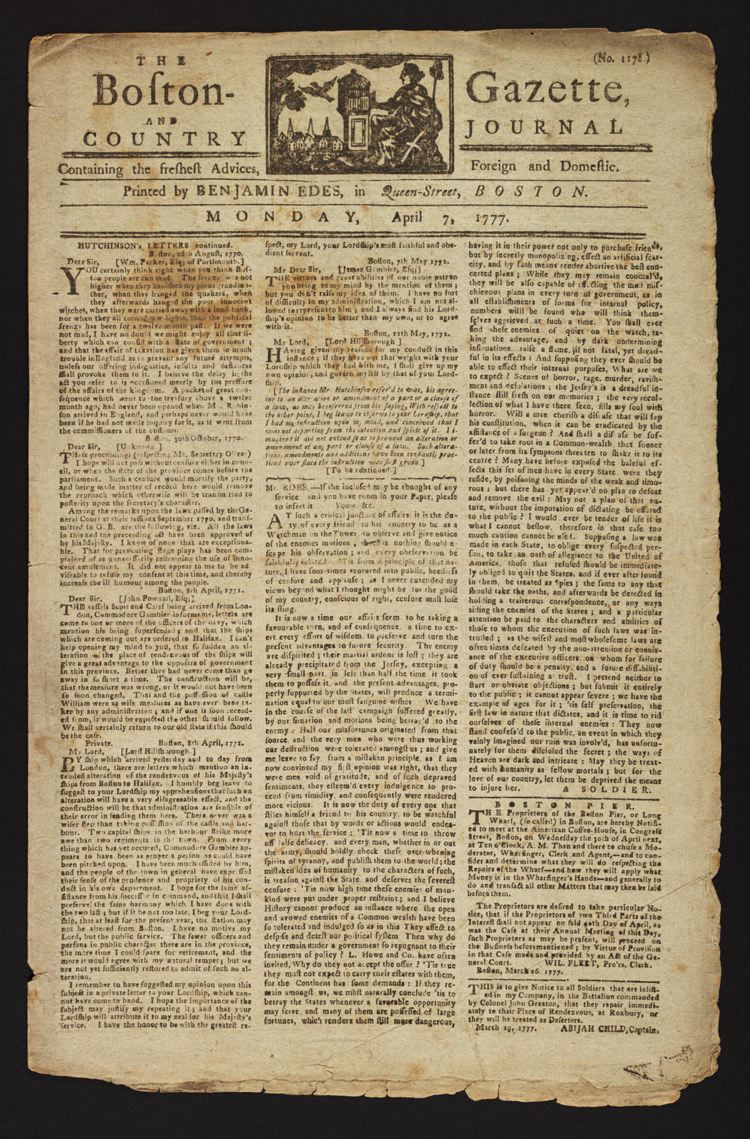
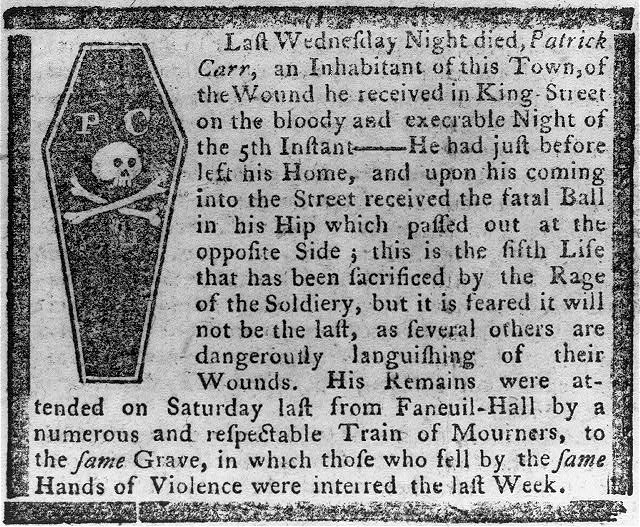
Obituary of Patrick Carr, Boston Massacre victim. Boston Gazette, 19 March 1770. Engraving by Paul Revere.
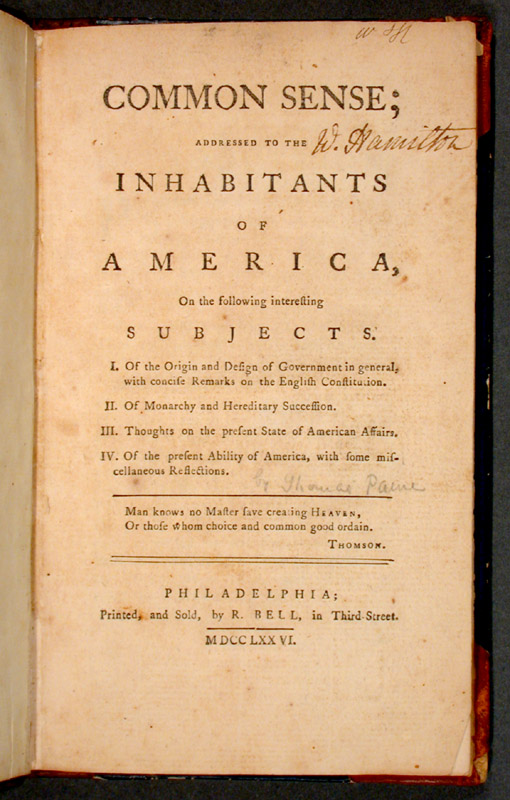
Common Sense[1] is a 47-page pamphlet written by Thomas Paine in 1775–1776 advocating independence from Great Britain to people in the Thirteen Colonies. Writing in clear and persuasive prose, Paine collected various moral and political arguments to encourage common people in the Colonies to fight for egalitarian government. It was published anonymously on January 10, 1776,[2] at the beginning of the American Revolution and became an immediate sensation.
It was sold and distributed widely and read aloud at taverns and meeting places. In proportion to the population of the colonies at that time (2.5 million), it had the largest sale and circulation of any book published in American history.[3] As of 2006, it remains the all-time best-selling American title and is still in print today.[4]
EX500rider
(10,915 posts)LeftInTX
(26,109 posts)marybourg
(12,668 posts)grumpyduck
(6,322 posts)it's a character used back then to show a soft s:
https://www.theguardian.com/notesandqueries/query/0,5753,-24563,00.html
https://www.livescience.com/65560-long-s-old-texts.html
What gets me about these old newspapers is that they were typeset by hand, including the right justification. I worked in a printing shop for a while in high school and learned how to set type: you learn how to read a mirror image. And the point size in those old papers was tiny.
Emrys
(7,335 posts)...
In general, the long s fell out of use in roman and italic typefaces in professional printing well before the middle of the 19th century. It rarely appears in good-quality London printing after 1800, though it lingers provincially until 1824 and is found in handwriting into the second half of the nineteenth century, and is sometimes seen later on in archaic or traditionalist printing such as printed collections of sermons. Woodhouse's The Principles of Analytical Calculation, published by the Cambridge University Press in 1803, uses the long s throughout its roman text.
...
The long s disappeared from new typefaces rapidly in the mid-1790s, and most printers who could afford to do so had discarded older typefaces by the early years of the 19th century. Pioneer of type design John Bell (1746–1831), who started the British Letter Foundry in 1788, is often "credited with the demise of the long s". Paul W. Nash concluded that the change mostly happened very fast in 1800, and believes that this was triggered by the Seditious Societies Act. To discourage subversive publications, this required printing to name the identity of the printer, and so in Nash's view gave printers an incentive to make their work look more modern.
https://en.wikipedia.org/wiki/Long_s
DavidDvorkin
(19,541 posts)who did not have the support of the majority and were determined to impose their will on their fellow colonists by force.
Wonder Why
(3,523 posts)They were posted on the town hall web site. It was called a web site then because of all the spiders.
Docreed2003
(16,934 posts)Some of the British subjects within the colonies rebelled and the British government responded to the rebellion. Had the revolution not been successful, the participants would likely faced charges of treason.
GenThePerservering
(1,981 posts)the amount of confusion in this thread is saddening.